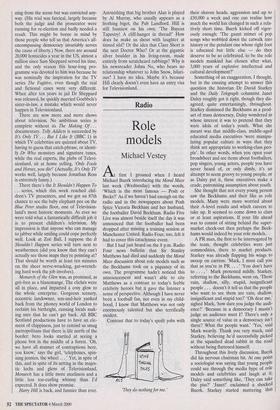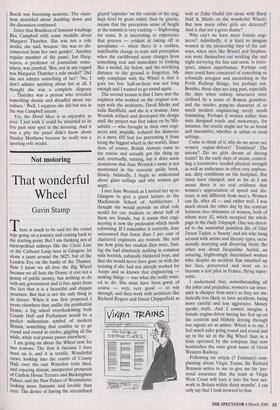Radio
Role models
Michael Vestey
t first I groaned when I heard Michael Buerk introducing the Moral Maze last week (Wednesday) with the words, `Which is the most famous — Posh or Becks?' As if we haven't had enough on the radio and in the newspapers about Posh Spice Victoria Beckham and her husband, the footballer David Beckham. Radio Five Live was almost beside itself the day it was announced that the footballer had been dropped after missing a training session at Manchester United. Radio Four, too, felt it had to cover this cataclysmic event.
But I had just heard on the 8 p.m. Radio Four news bulletin that Sir Stanley Matthews had died and suddenly the Moral Maze discussion about role models such as the Beckhams took on a piquancy of its own. The programme hadn't noticed this announcement and wasn't able to cite Matthews as a contrast to today's feeble celebrity heroes but it gave the listener a sense of perspective. Although I have never been a football fan, not even in my child- hood, I know that Matthews was not only enormously talented but also terrifically modest.
Contrast that to today's spoilt yobs with `They do nothing for me.' their shaven heads, aggression and up to £50,000 a week and one can realise how much the world has changed in such a rela- tively short time. Buerk kicked off vigor- ously enough: The gaunt mimer of pop songs who wobbled down the catwalk into history or the petulant one whose right foot is educated but little else — do they deserve to be so celebrated, to be the role models mankind has chosen after what, 3,000 years of explosive intellectual and cultural development?'
Something of an exaggeration, I thought, but in the ensuing attempt to answer this question the historian Dr David Starkey and the Daily Telegraph columnist Janet Daley roughly got it right, though they dis- agreed, quite entertainingly, throughout. Starkey dismissed the Beckhams as a prod- uct of mass democracy, Daley wondered in whose interest it was to pretend that they were idols of today's youth. What she meant was that middle-class, middle-aged educated media executives 'were manipu- lating popular culture in ways that they think are appropriate to working-class peo- ple'. In other words, when you open your broadsheet and see items about footballers, pop singers, young actors, people you have never heard of, or only dimly, it's an attempt to seem groovy to young people, or as Daley put it, these executives make a crude, patronising assumption about youth.
She thought that not every young person saw the Beckhams and their like as role models. Many were more worried about their A-level results and which careers to take up. It seemed to come down to class or at least aspirations. If your life ahead was to consist of sitting behind the super- market cheek-out then perhaps the Beck- hams would indeed be your role models.
A PR man, the first to be interrogated by the team, thought celebrities were just commodities, there to market products. Starkey was already flapping his wings to swoop on carrion: 'Mark, I must call you that as you're in PR . . . "You don't have to . , ' Mark protested mildly. Starkey, referring to the Beckhams, went on, These vain, shallow, silly, stupid, insignificant people . . . doesn't it tell us that the people who want to see them are vain, shallow, insignificant and stupid too?' Oh dear me,' sighed Mark, 'how dare you judge the audi- ence?' Because in a democracy I mustn't judge an audience must I? There's only a single source of value in a democracy isn't there? What the people want.' Yes,' said Mark wearily. Thank you very much, said Starkey, believing he'd successfully picked at the squashed dead rabbit in the road without being flattened himself. Throughout this lively discussion, Buerk did his nervous chairman bit. At one point a sociologist was saying that young people could see through the media hype of role models and celebrities and laugh at it; Daley said something like, 'They can take the piss?' ..Tanet!' exclaimed a shocked Buerk. Starkey started muttering that Buerk was becoming neurotic. The chair- man mumbled about dumbing down and the discussion continued.
Enter that Boudicca of feminist windbags Bea Campbell with some twaddle about Margaret Thatcher. She was not a role model, she said, because 'she was so dis- connected from her own gender'. Another regular member of the panel, Ian Harg- reaves, a professor of journalism some- where, was puzzled. 'Bea, not in any regard was Margaret Thatcher a role model?' Did she not admire something of her? 'No, I don't admire anything about her at all. I thought she was a complete disgrace . . Thatcher was a person who revealed something drastic and dreadful about our culture.' Well, I suppose she did but not in the way Campbell meant. Yes, the Moral Maze is as enjoyable as ever. I just wish it could be returned to its five past nine spot in the morning. And it was a pity the panel didn't know about Stanley Matthews because he really was a sporting role model.



































































 Previous page
Previous page